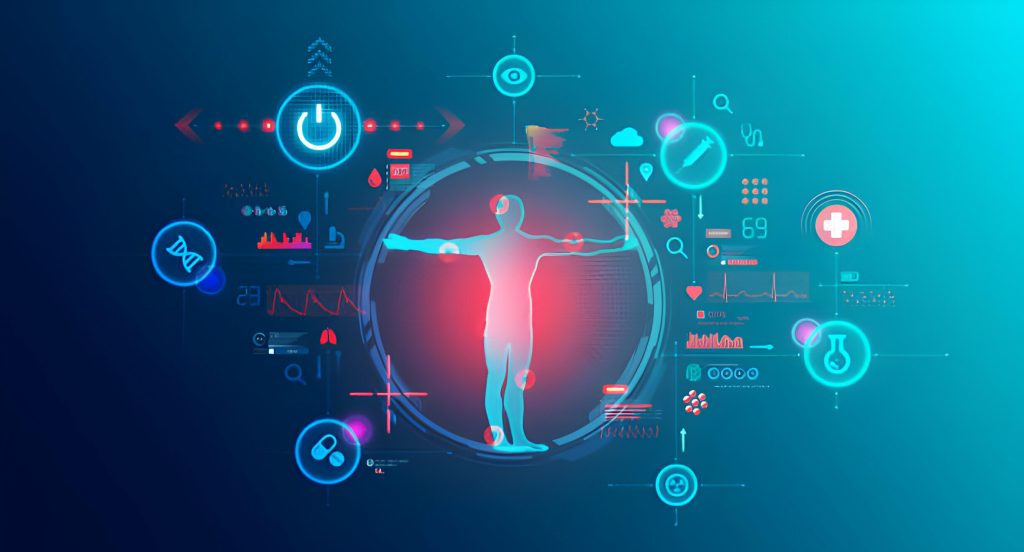Imagine a world where machines can detect diseases before they even show symptoms. Picture a future where virtual assistants handle the mundane tasks of healthcare, allowing doctors to focus on what truly matters – your health. AI is making these possibilities a reality in the field of medicine. From analyzing medical images to predicting patient outcomes, artificial intelligence is revolutionizing healthcare like never before. In this article, we will explore some fascinating examples of AI in health that are changing the way we receive care.
AI in Medical Imaging
AI in medical imaging helps you detect anomalies and analyze biopsy slides, improving accuracy and efficiency in radiology and pathology. With AI algorithms, medical images such as MRIs, X-rays, and CT scans can be analyzed to identify diseases and medical conditions. Machine learning enhances the detection and classification accuracy of abnormalities in these images. Additionally, AI assists radiologists in making more accurate diagnoses by reviewing patient records and recommending treatments based on clinical trial results. In the field of virtual assistants and administrative tasks, AI-powered assistants help doctors manage clinic tasks like scheduling appointments and keeping records. Moreover, AI is used in predictive analytics to make predictions about patient outcomes and detect healthcare fraud by analyzing patterns in data. In chatbots and patient care, chatbots engage with users through chat interfaces to provide basic information, answer questions, assist in patient care, and perform administrative tasks.
AI in Virtual Assistants and Administrative Tasks
Using virtual assistants powered by AI can help you manage administrative tasks and scheduling appointments more efficiently. These AI-powered assistants are designed to streamline workflow optimization, appointment management, electronic health record integration, patient data privacy, and AI-powered decision support. With the assistance of virtual assistants, you can automate manual workflows and operational tasks in healthcare, freeing up your time for more complex tasks and cases. These intelligent assistants utilize machine learning to predict patients in need of care and assistance, ensuring that you can provide timely and personalized support. By harnessing the power of AI in virtual assistants, you can enhance your productivity and focus on delivering high-quality patient care while leaving the administrative burden to technology.
| Discussion Ideas | Benefits |
|---|---|
| Workflow optimization | Streamline processes |
| Appointment management | Efficient scheduling |
| Electronic health record integration | Seamlessly access patient information |
| Patient data privacy | Ensure confidentiality |
| AI-powered decision support | Make informed decisions based on data insights |
AI in Predictive Analytics and Fraud Detection
When it comes to predictive analytics and fraud detection, you can rely on AI algorithms to analyze patterns in data and help identify potential risks or fraudulent activities. In the healthcare industry, AI plays a crucial role in predictive modeling for healthcare outcomes. By analyzing vast amounts of data, AI algorithms can predict patient outcomes and provide valuable insights for personalized care. Additionally, AI is instrumental in fraud detection in healthcare claims. Machine learning algorithms can detect patterns of fraudulent behavior and flag suspicious claims, helping insurance companies prevent financial losses. Furthermore, AI is used in determining insurance eligibility by analyzing various factors and making accurate predictions based on historical data. Overall, AI-powered predictive analytics in healthcare not only assists in preventing fraud but also enhances decision-making processes for better patient outcomes.
AI in Chatbots and Patient Care
Chatbots are virtual assistants that engage in conversations with you through chat interfaces, providing basic information and answering your questions. When it comes to patient care, AI in chatbots has raised ethical considerations, as these systems handle sensitive medical information. Privacy concerns have also emerged as patient data needs to be protected from unauthorized access. Integration challenges arise when implementing chatbots into existing healthcare systems, requiring seamless integration for smooth operation. Patient acceptance is another important aspect to consider, as some individuals may prefer human interaction over interacting with a machine. Lastly, the impact on healthcare professionals cannot be ignored, as chatbots may change the way they deliver care and interact with patients. It’s crucial to carefully address these considerations and concerns while leveraging AI in chatbots for improved patient care experiences.
AI-assisted Diagnosis and Treatment
AI-assisted diagnosis and treatment have the potential to revolutionize healthcare by providing physicians with valuable insights and recommendations based on patient records. With AI’s ability to analyze vast amounts of data quickly, it can assist in decision-making, clinical trial recommendations, and the development of new treatment algorithms. This advancement in precision medicine allows for personalized care tailored to each patient’s specific needs. Furthermore, AI can aid in patient risk assessment by identifying potential risks or complications early on, enabling proactive interventions. The integration of AI into healthcare not only improves efficiency but also enhances the accuracy of diagnoses and treatment plans. By harnessing the power of AI, healthcare professionals can make more informed decisions, leading to improved outcomes for patients.
AI-powered Drug Discovery
Now that you’ve learned about AI-assisted diagnosis and treatment, let’s explore another fascinating application of AI in healthcare: AI-powered drug discovery. This field is revolutionizing the way new drugs are identified and developed. With AI-enabled drug discovery, scientists can harness the power of artificial intelligence to analyze vast amounts of medical research, genetic information, and health records. Here are four key aspects of AI-powered drug discovery:
- AI enabled genomics: By exploring patient genomes, AI can predict disease risks and even study fetal genetic makeup for potential insights.
- AI powered robotics in healthcare: Robotics play a crucial role in surgical procedures and decision-making with the help of advanced AI algorithms.
- AI enhanced telemedicine: Through telemedicine, AI improves remote healthcare by aiding in remote diagnosis and treatment planning while enabling personalized and efficient virtual care.
- AI-driven mental health support: Using patient data analysis, AI offers personalized recommendations and interventions for mental health support and counseling.
With these innovative advancements, the future of drug discovery looks promising as we continue to unlock new treatments using the power of artificial intelligence.
AI in Wearable Devices and Sensors
Wearable devices and sensors utilize AI to interpret data, providing valuable insights for personalized care. AI plays a significant role in remote monitoring, fitness tracking, sleep analysis, health tracking, and even smart clothing. With AI in remote monitoring, wearable devices can collect real-time data about your vitals and send it to healthcare professionals for analysis. AI in fitness tracking allows these devices to track your exercise routines and provide recommendations based on your goals. In sleep analysis, AI can analyze your sleep patterns and suggest ways to improve the quality of your rest. Additionally, AI in health tracking helps monitor chronic conditions by continuously analyzing data from wearable devices. Finally, with AI in smart clothing, sensors embedded in the fabric can detect changes in body temperature or heart rate and provide immediate feedback or alerts for potential health issues.



